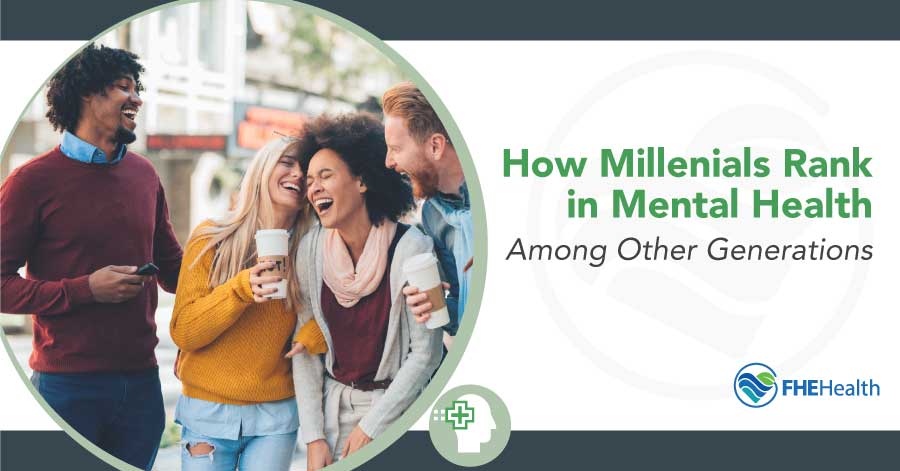
Mental health has become a prominent discussion topic among researchers and policymakers each year as more people report struggling with anxiety, depression and other psychological health conditions. Generation Z and millennial mental health issues have been particularly analyzed and explored due to the rising numbers in cases and the different lifestyles these two age groups lead from their predecessors.
A report by Blue Cross Blue Shield Association reveals that since 2013, the diagnosis of major depression in millennials has risen by 47%, as opposed to 33% for all other age groups. This statistic doesn’t come as a surprise as millennials compose half of the overall American workforce, and by 2030 this number is expected to rise to 75%.
When we pair the demands from the workplace with the rising pressures from economic instability and our fast-paced lifestyles, it’s easy to see how millennials’ well-being can be compromised.
Major Contributing Factors to Millennial Mental Health Issues
At FHE Health, we acknowledge that mental health is never one-dimensional, and many factors can impact how a person feels and behaves. Here we explore the top four factors that can have particularly adverse effects on millennials’ mental health.
1. Increased Reliance on Social Media
For better or worse, social media has seen increased adoption in the last decade across all generations. Social media platforms have become second nature to many millennials who, together with generation Z, are the biggest social media users today.
While the impact social media has on any one person depends on their circumstances, the American Psychological Association has found that in the past decade, electronic communication and social media usage have contributed to an increase in mood disorders and suicidal thoughts.
Reasons include:
- Social media users are losing opportunities for in-person interactions, which can help form stronger and deeper bonds with other individuals.
- Reduced social contact with others can have a significant effect on mood, self-esteem and overall well-being.
- An unavoidable effect of FOMO (fear of missing out) as individuals check their peers’ profiles and feel like they’ve been left out of interactions or events, which contributes to feeling isolated and excluded.
2. Substance Abuse
The pressures of everyday life can tempt millennials to resort to drugs or alcohol as a coping mechanism. However, this can often spiral out of control when users can no longer control their consumption, which can develop into an addiction.
A Blue Cross Blue Shield Association report revealed that people who suffer from significant depression are seven times as likely to suffer from alcohol or substance abuse as well. Continuous alcohol consumption can severely lower millennial serotonin levels, making them more prone to developing mental health disorders. For instance, increased alcohol consumption can lead to alcoholic rage symptoms, whereas alcohol withdrawal can cause headaches, insomnia and anxiety.
Unfortunately, substance abuse is shrouded in stigma, making it more difficult for individuals to open up and seek help. This further exacerbates millennial mental health issues, as they may refuse to accept they’re having a problem or try to hide their addiction because of shame.
3. Changing Attitudes to Work and Life
Millennial and generation Z individuals live vastly different lives from previous generations that didn’t have access to technological advancements. While the aftermath of World War II mainly impacted baby boomers’ mental health, millennials have been raised in a period of relative peace and prosperity.
These recent generations have been taught to seek out opportunities and make the most of life, since their parents weren’t been able to. And while on the surface this looks like a relatively positive trend, it can cause many underlying mental health issues, as some of these embedded expectations cannot be met. For instance, unlike previous generations that preferred security and stability on the job, gen Z and millennials seek fulfillment and opportunities for growth, which can be more esoteric and difficult to reach.
They’re also more prone to job-hopping and pursuing self-employment, adding more uncertainty to the mix and leading to burnout, restlessness and anxiety. All of these aspects can impact a millennial’s sense of purpose and success in life and negative perceptions of themselves.
4. Sedentary Lifestyle
It’s no secret that a large portion of the knowledge workforce spends most of their days seated in front of a computer. Likewise, the convenience of online shopping, online interactions and on-demand streaming entertainment has made it very easy for people to never leave their couch.
Millennials are one of the most health-conscious generations, known to pay close attention to their diets. However, the benefits gained from these habits are outweighed by the sedentary behavior that makes them less active and more obese than other age groups. In fact, two-thirds of millennials don’t make time in their week for physical exercise.
A sedentary lifestyle can often lead to increased stress, anxiety, and depression, as the body needs the endorphins and stimulation that come from movement and exercise. This often-overlooked element of our modern lifestyle is a silent but powerful contributing factor to the development of millennial mental health issues.
Mental health issues are deeply personal experiences that affect each individual differently. However, despite the lack of understanding and taboo that surround mental health, these issues are more common than we think. At FHE Health, we’re dedicated to advancing the knowledge and comprehension of mental health issues and how they affect each age group. In this effort, we designed and launched an inter-generational survey to look at people’s perception of mental health as well as their overall well-being.
If you suspect or know you suffer from mental health issues, you must seek out help. Early treatment can significantly reduce your recovery time and improve the overall outcome of your care. At our facilities, we take a holistic approach to treating mental illnesses by offering personalized and fully immersive environments where you can feel supported, accepted, and encouraged to prosper.
Call us today. Our compassionate team of counselors is available 24/7 at (833) 596-3502 to offer the support you need.






